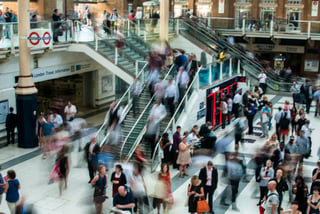
Industrial and commercial floors take serious abuse. Daily foot traffic, heavy machinery, large equipment, and constantly-moving inventory can all wear it down bit by bit, eventually causing areas of noticeable damage.
If you are an industrial or commercial site owner (whether it's a retail space, manufacturing plant, warehouse, or another type of facility), then you have the monumental task of selecting a flooring option that can withstand high levels of daily wear and tear. Here are some of the options and their varying levels of suitability:
Hardwood
While hardwood is undeniably attractive, it’s typically not a good choice for high-traffic areas. Once hardwood’s outer layer of polyurethane, varnish, paint, or other material is scratched off, the wood underneath will be quickly eroded by abrasives from shoes and machinery. Worse, moisture can seep into the wood itself, weakening and even rotting it.
Hardwood is also highly expensive to install and replace. Unless your floors have historic value or you’re trying to create a very specific aesthetic for customers, hardwood is probably too high-maintenance and unreliable for high-traffic areas.
Vinyl
Vinyl flooring is available in sheets, squares, or simulated planks and comes in many strength and quality grades. It can work in many commercial settings such as restaurants, offices, and retail spaces that don’t experience high amounts of traffic. If tennis shoes and dress shoes are the most likely source of wear for your facility, vinyl may work well for you.
However, vinyl is a poor fit for floors that must hold up under heavy loads, such as forklifts and other machinery, or heavy work boots that may gouge the soft surface. It’s also not ideal for handling large amounts of dust or debris. In industrial settings, vinyl may undergo bonding failure in as quickly as a year.
Tile
Ceramic or concrete tile has similar uses and properties to vinyl. Although tile can be more durable in terms of toughness and density, it is prone to cracking under heavy weight. In addition, debris and moisture can seep into the porous grout between the tiles.
Maintaining tile can be costly for site owners, since it is susceptible to frequent cracking or breakage. Therefore, tile is not recommended for industrial applications, though it may be useful in some retail settings.
Steel Floor Plate
Steel has incredible durability properties and resistance to abrasion and wear. Many steel products can be subject to corrosion, but chemical-resistant coatings can eliminate this drawback. Steel floor plates are also lightweight compared to other options like tile or concrete. Since they can serve a rigid structural purpose, they will often pull “double duty” as flooring and structural support.
However, steel plates are costly to purchase and install, and often prohibitively expensive for general flooring applications. Therefore, steel plate flooring is generally best used for raised structures such as catwalks and platforms.
Concrete
Concrete flooring is a practical solution for many industrial applications, and can even make a bold statement for commercial and retail spaces.
One of concrete’s main benefits is its extremely low cost: most buildings already have an underlying concrete slab, and newly poured concrete can easily take the shape of any structure if the mold is made well. Concrete combined with steel under-decking makes for a relatively light, cheap flooring structure that can resist huge amounts of wear over time.
Concrete is naturally stronger than tile, vinyl, and hardwood and withstands heavy traffic much more easily, even from heavy machinery. Unfinished concrete can be subject to cracking, spalling, and dusty shedding, so it’s often recommended that a protective floor coating such as epoxy or urethane be applied every few years to keep out moisture and further improve abrasion resistance.
Though it lacks the “warmth” of hardwood or vinyl for retail spaces, concrete can be polished to a durable and attention-grabbing shine. It can also be dyed or stained to a variety of attractive colors, or have a decorative epoxy applied.
Need an expert opinion?
Not sure which option is right for you? Get in touch with our flooring experts to learn more about what type of industrial flooring would work best for your high-traffic site and which industrial floor coating can help it stay intact longer. You can reach CPC Flooring by phone at (864) 855-0600 or contact us online at any time to schedule a consultation.

